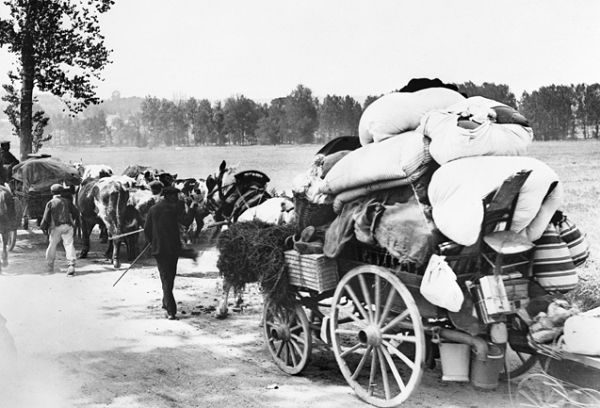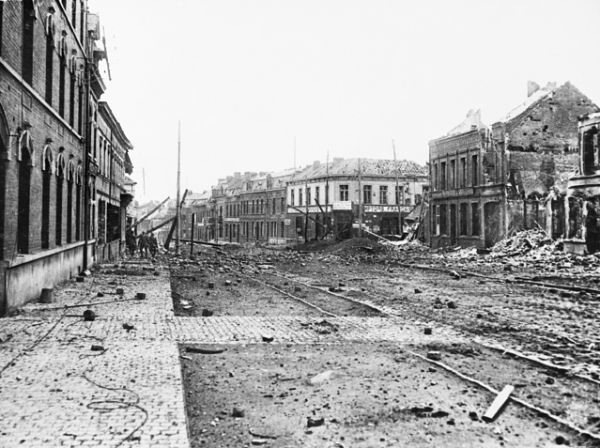Melbourne Tram Museum
- Follow Melbourne Tram Museum on Twitter
- Follow Melbourne Tram Museum on Facebook
- Follow Melbourne Tram Museum on Instagram
- Follow Melbourne Tram Museum on Pinterest
- Follow Melbourne Tram Museum on Tumblr
- Subscribe to Melbourne Tram Museum's RSS feed
- Email Melbourne Tram Museum
Letter from France, November 1918
This poor little village is very much knocked about. Many of the insides of the houses are ripped to pieces, and one sees oddments of furniture scattered all over the place. The 4th Australian Light Horsemen had their mess in what was once a little terrace of brick cottages. The place had been battered about, but the men had made it fairly comfortable. They discovered plenty of wood and coal left behind by the Boche, and when we visited them they had a cheery fire burning, and gave us nice afternoon tea with hot scones and cakes, all made by one of the Aussies. We drank out of basins and tin mugs.
While we were enjoying our tea in walked an old Frenchman and his daughter. This was his home, which he had not seen for four years, owing to the German occupation. They went about the room and touched the furniture most lovingly. It was pathetic to see them. Especially glad were they to find the fireplace, mirror and their heirloom cupboard undamaged.

French refugees returning home, passing through the Reuil area, France, c1918.- Photograph courtesy Australian War Memorial (H09365).
In most of these French houses, no matter how humble, there is a fine old cupboard. In a little home where I was once billeted there was a cupboard more than 200 years old. The owner was only a poor peasant woman, but she would not part with it, although offered large sums for it.
One of these cupboards was included in this home where the Australian soldiers had settled, also a fine wardrobe and two polished tables. The Light Horse were ordered to advance the next day, so the rightful owner was able to take possession much sooner than he expected. The Huns had been ejected only a few weeks previously.
I left very soon afterwards for a small town near Valenciennes. It is most interesting following up the advance like this and being attached to the first casualty clearing stations to come to these parts. In this place the main bridge across the canal had been blown up by the gentle Hun, so we had to cross on one that our troops had thrown across. The town had the French flag flying from nearly every window.

Valenciennes, France, c1918, during the capture of the town from German Army forces. Three British Army soldiers are on the left. Note the tram tracks – the original steam tramway was opened in 1881 and had been converted to electric in 1914. Over the period 1919 to 1923, the tramway was rebuilt – the power stations had been destroyed during the war and much of the infrastructure was damaged. The tramway closed in 1966, however a new light rail system was opened forty years later, in 2006.- Photograph courtesy Australian War Memorial (H09717).
The scene was very gay but it was terrible to see the white, thin faces of the people, especially the little children. These people had been four years in the power of the Germans, and had never tasted meat all that time, just bread and grease, and vegetables sometimes.
The experience has left its mark on them. The Field Ambulance men who arrived before us saw most pathetic sights. The whole population was ravenous. Those who were given food simply bolted it down their throats without any attempt at mastication. One man ate steadily for two hours and even then was not satisfied. Our soldiers had to give him another meal. When they first arrived our men saw women cutting up dead horses and fighting in the streets for the flesh.
We are quartered in a large school. It has been a magnificent building, but when we took possession it was in a dreadful state of filth and neglect. The Huns had cut off the water supply, destroyed the drainage pipes, and battered part of the building with bombs. The engineers came along before some of the bombs exploded, and so saved the place from being entirely demolished. In a few days we had it converted into a clean and comfortable hospital.
Bibliography
Département du Nord (1919), Procès-Verbaux des Délibérations du Conseil Général, Session Extraordinaire de Décembre 1918
Jewish Herald (1919), A Jewish Nurse with the Allies, 24 January 1919